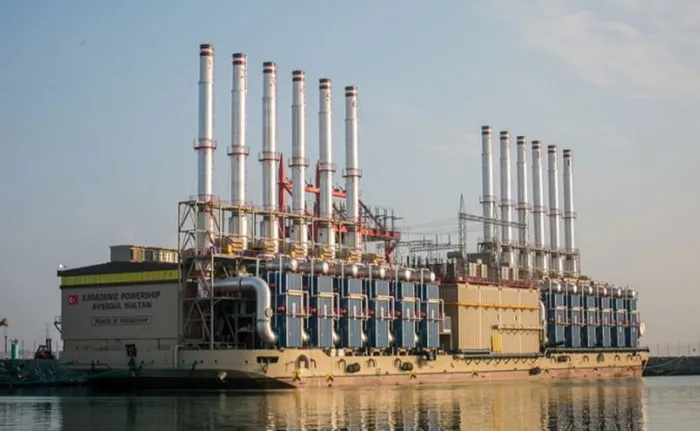Karpowership set to skyrocket electricity bill

South African government is pushing ahead with Karpowership to improve energy availability. Picture: Supplied
SOUTH Africans have been cautioned that the arrival of the much anticipated international power supplier Karpowership will force them to dig deeper into their pockets as electricity prices will skyrocket.
The Organisation Undoing Tax Abuse (Outa), which is vehemently opposed to the Karpowership project, issued the warning amid the Department of Transport’s announcement that three harbours have been opened for the docking of ships belonging to Turkish company Karadeniz Energy Group.
Last month, the department announced that it had authorised the Karpowership vessels access to the harbours in Ngqura in Gqeberha, Richards Bay and Saldanha Bay for 20 years.
The Department of Mineral Resources and Energy revealed Karpowership SA as the preferred bidder to provide the country’s grid under the Risk Mitigation Independent Power Producers Procurement Programme in 2021.
Outa has stated in its North Gauteng High Court challenge to the Karpowership deal that the 20-year period deal to provide electricity could cost the government more than R200 billion.
However, according to Electricity Minister Dr Kgosientsho Ramokgopa, the project should not last longer than five years to avoid burdening the state with huge costs.
Outa’s chief executive Wayne Duvenage projected that once Karpowership starts feeding the country with electricity, the consumers would be charged five times more than they are currently charged.
“The electricity from Karpowership will be over R3 per kilowatt-hour (whereas) the cost of the alternative option, which is renewable, is 40 cents per kilowatt,” said Duvenage.
Outa based its concerns on a study conducted by a group called Meridian Economics and the Council for Scientific and Industrial Research, who in July 2021 released a report on warning that Karpowership gas-fired energy “may create an economic burden for ratepayers”.
“This would mean that for over half of their operational life, they would represent an uneconomic and unnecessary addition to South Africa’s electricity. The report recommended that South Africa should at least focus on immediately starting to build capacity for renewable energy.
Duvenage said Outa had approached the high court against the Karpowership to protect the interest of taxpayers.
Outa and Karpowership are still embroiled in a technical legal battle over access to the company’s unredacted documents detailing the multi-billion rand deal.
Two NGOs, Outa and Green Connection, want the National Energy Regulator of SA’s (Nersa’s) decision to grant electricity generation licenses to Karpowership reviewed and set aside.
Karpowership has been accused of seeking to put a restrictive confidentiality regime in relation to the information it provided to Nersa.
Outa maintains that Karpowership’s restrictive confidentiality is unwarranted and the two parties have reached a stalemate on the production of the full record of Nersa’s decision.
Nersa has also told the court that Karpowership has requested that certain parts of the information it provided to the regulator be treated with confidentiality.
The regulator has also failed to act independently and impartially by strongly siding with Karpowership and submitting a heavily redacted record of its decision, according to Outa.
”It is submitted that Nersa has not acted independently and impartially and that it has attached far greater weight to Karpowership’s alleged commercial interests than the public interest. Its attempt to act as adjudicator on the question of which party’s interests should be given preference belies its independence as a regulator,” the organisation argues in court papers.
Nersa is also accused of impermissibly taking it upon itself to decide what should be excluded from the record and what not in an unauthorised and biased manner.
Karpowership has maintained that disclosure of the competitive information required by Outa would harm the company’s commercial and financial interests and therefore should not be made available for public inspection. Nersa issued 20-year generation licenses on September 21, 2021, for the Karpowerships to feed the country’s grid.
Nersa spokesperson Charles Hlebela said the company would still have to obtain “any other applicable rights, permits or licenses as may be required by other authorities (which he did not mention).”
“Nersa issued generation licenses after duly undergoing a public participation process (public hearings),” said Hlebela.
He said the 20-year deal was based on a power purchase agreement (PPA), which Karpowership had applied for, and if there would be a need to change the PPA period, as suggested by Ramokgopa, the company would have to submit another application for the approval of such change.
“In that case, Nersa will look at the impact of the change in the PPA term on the approved tariff,” Hlebela said.
In denying that Karpowership would cause the electricity prices to skyrocket, Hlebela said although this may affect bills electricity consumers will have to pay, “the impact of Karpowership costs on electricity prices is anticipated to be manageable within the overall supply mix, noting the electricity supply crisis that the country is currently facing”.